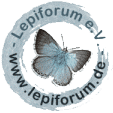1. Lebendfotos
1.1. Falter
1.2. Raupe
2. Diagnose
2.1. Männchen
2.2. Weibchen
2.3. Geschlecht nicht bestimmt
2.4. Genitalien
2.4.1. Männchen
2.5. Erstbeschreibung
3. Biologie
3.1. Nahrung der Raupe
- [Rubiaceae:] Galium album [= Galium mollugo sensu auct.] (Wiesen-Labkraut)
- [Asteraceae:] Artemisia campestris ?? (Feld-Beifuß ??)
- [Urticaceae:] Urtica urens ??? (Kleine Brennnessel ???)
Der oben gezeigte Raupen-Fund von M. Stemmer am dort zahlreich wachsenden Wiesen-Labkraut (Galium album) im ökologisch bewirtschafteten Weinberg bei Unkel in Rheinland-Pfalz scheint die erste gut abgesicherte Raupenmeldung zu dieser Art zu sein.
Barrett (1904: 187) konstatierte zu Mecyna flavalis u.a.: "Ragonot says "the larva has been supposed to feed on bedstraw (Galium verum), and certainly the imago affects dry pasture fields where this plant is common"." Da M. lutealis bis Marion (1951) als Synonym zu M. flavalis galt, könnte sich die damalige Vermutung auch auf M. lutealis bezogen haben. Slamka (2013: 96) listet jedenfalls bei M. lutealis nur Pflanzen auf, die er auch schon für M. flavalis genannt hatte: "The larva feeds on Artemisia spp. (A. campestris) and Galium spp. (Galium mollugo also reputedly on Urtica urens." Artemisia scheint dabei alles andere als sicher belegt zu sein und Urtica urens ist mit ziemlicher Sicherheit falsch.
4. Weitere Informationen
4.1. Andere Kombinationen
- Botys lutealis Duponchel, [1833] [Originalkombination]
4.2. Synonyme
- Botys citralis Herrich-Schäffer, 1849
- Pyrausta gomagoialis Amsel, 1932
4.3. Faunistik
Gemäß Fauna Europaea und anderen Quellen ist die Art in großen Teilen quer über Europa zu finden, so in Spanien, Frankreich, Belgien, Deutschland, der Schweiz, Österreich, Italien, Rumänien, Bulgarien, Albanien, Nordmazedonien und Griechenland. Völlig überraschend kann Tsvetkov (2016) über den Fund mehrerer Falter im russischen Südural berichten.
(Autor: Erwin Rennwald, mit Ergänzung von Jürgen Rodeland)
Plant (2016: 2) schließt die Art wegen Fehlbestimmung aus der Fauna Bulgariens aus.
4.4. Publikationsjahr der Erstbeschreibung
Woodward (1922: 379) [Digitalisat auf biodiversitylibrary.org] teilt die Publikationsjahre des Bandes mit: 1-224 und pl. 211-224 1832, 225-336 und pl. 225-232 1833, 337-“[403]” [sic, recte: 400] und pl. 233-236 1834.
Die bereits [1832] erschienene Tafel CCXXIII ist allein nicht als Erstbeschreibung gültig, weil sie uninominal beschriftet ist: Die Gattungsnamen sind nur in französischer Sprache angegeben.
(Autor: Jürgen Rodeland)
4.5. Literatur
- Alipanah, H. & F. Slamka (2023): A revision of the subfamily Spilomelinae (Lepidoptera, Crambidae) in Iran with description of a new species. — Zootaxa 5248 (1): 1-70.
- Barrett, C. G. (1904): The Lepidoptera of the British Islands 9 Heterocera. Geometrina—Pyralidina: 1-454. pl. 377-424. London (Lovell Reeve and Co. Limited).
- Erstbeschreibung: Duponchel, P.-A.-J. („1831“) [1832-1834]: Histoire naturelle des lépidoptères ou papillons de France. Tome huitième. IIe Partie: 1-400, pl. CCXI-CCXXXVI. Paris (Méquignon-Marvis).
- Marion, H. (1951): Mecyna lutealis Dup. bona species et f. citralis H.-S. (Crambidae). — Revue française de Lépidoptèrologie, 13 (1–2): 10–15. [Sekundärzitat]
- Plant, C. W. (2016): An Annotated Systematic, Synonymic and Distributional Checklist of the Pyraloidea of Bulgaria. — Neue Entomologische Nachrichten 72: 1-231. [PDF auf zobodat.at]
- Slamka, F. (2013): Pyraloidea of Europe (Lepidoptera). Volume 3. Pyraustinae & Spilomelinae. Identification - Distribution - Habitat - Biology. — 357 S., 133 Taf. mit Genitalabb., 31 Farbtaf. mit fast 1100 Bildern – Bratislava (Eigenverlag František Slamka).
- Tsvetkov, E.V. (2016): Mecyna lutealis (Duponchel, 1832), a new Сrambid moth (Lepidoptera: Crambidae) in the fauna of Russia [Цветков, E.B. (2016): Mecyna lutealis (Duponchel, 1832) – новая огневка (Lepidoptera: Crambidae) в фауне России. — Caucasian Entomological Bulletin [Кавказский энтомол. бюллетень], 12 (1): 143–144. [zum Artikel und PDF-Download auf researchgate.net]
- Woodward, B. B. (1922): Catalogue of the Books, Manuscripts, Maps and Drawings in the British Museum (Natural History). Vol. VI. Supplement: A–I: i-iv, 1-511, 1-48. London.



![Vorkommen in Österreich [Huemer (2013: NR 3572)]](/res/img/flag/at.png)
![Vorkommen in Tschechien [nach Liška J. et al.(2014) Faunistic Records from the Czech Republic - 361]](/res/img/flag/cz.gif)
![Vorkommen in Ungarn [Pastorális et. al. (2018): A Magyarországon előforduló molylepke-fajok névjegyzéke]](/res/img/flag/hu.gif)
![Vorkommen in Luxemburg [Meyer (1987)]](/res/img/flag/lu.gif)
![Vorkommen in Frankreich (europäisches Territorium ohne Korsika) [Vandromme et al. (2020): Liste systématique et taxinomique des Lépidoptères de France]](/res/img/flag/fr.gif)
![Vorkommen in Spanien (Festland) [Garre & al. (2021)]](/res/img/flag/es.gif)
![Vorkommen in Italien (Festland und kleine festlandsnahe Inseln) [Bassi et al. (1995): Checklist delle Specie della Fauna Italiana 87]](/res/img/flag/it.gif)
![Vorkommen in Sizilien [Bassi et al. (1995): Checklist delle Specie della Fauna Italiana 87]](/res/img/flag/it-sic.png)
![Vorkommen in Kroatien [Gumhalter (2021)]](/res/img/flag/hr.gif)
![Vorkommen in Bosnien und Herzegowina [Plant & Jakšić (2018)]](/res/img/flag/ba.gif)
![Vorkommen in Serbien [Jakšić (2016): Tentative Checklist of Serbian microlepidoptera]](/res/img/flag/rs.gif)
![Vorkommen in Montenegro [Fotos Friedmar Graf in BH]](/res/img/flag/me.gif)
![Vorkommen in Nordmazedonien [Klimesch, J. (1968)]](/res/img/flag/mk.gif)
![Vorkommen in Albanien [Plant & Jakšić (2018)]](/res/img/flag/al.gif)
![Vorkommen in Rumänien [Rákosy L. & M. Goia (2021): Lepidopterle din România: lista sistematică şi distribuţie]](/res/img/flag/ro.gif)
![Vorkommen in Griechenland (Festland und festlandsnahe Inseln) [Plant & Jakšić (2018)]](/res/img/flag/gr.png)
![Unsicher determinierte Meldung für den asiatischen Teil der Türkei [Koçak & Kemal (2018), wohl falsch: die Angaben dürften sich auf Mecyna balcanica beziehen]](/res/img/flag/tr.gif)
![Vorkommen in Iran [Alipanah & Slamka (2023: 55)]](/res/img/flag/ir.gif)
![Vorkommen in Israel [Kravchenko, Poltavsky, Segerer, Speidel & Müller (2020)]](/res/img/flag/il.gif)






























